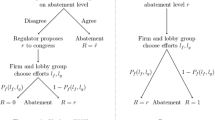Abstract
The purpose of this paper is to investigate what the consequences are if environmental regulation in terms of a price mechanism (effluent charges) erodes moral motivation (crowding-out). The findings suggest that a regime relying on voluntarism can do better than a mandatory regime depending on the number of individuals being intrinsically motivated, degree of moral motivation, crowding effects, and whether or not ethical utilities are accounted for. The optimal tax scheme is a discriminatory one with rates that differ across moral and non-moral individuals. This tax-scheme induces the first-best solution when social costs are considered, while the same solution becomes unattainable for a social welfare function. The model provides a rationale for why governments sometimes rely on voluntary effort.
Similar content being viewed by others
References
Andreoni, J. (1990). Impure altruism and donations to public goods: A theory of warm-glow giving. The Economic Journal, 100, 464–477.
Arora, S., & Gangopadhyay, S. (1995). Toward a theoretical model of voluntary overcompliance. Journal of Economic Behaviour and Organization, 28, 298–309.
Bontems, P., & Rotillon, G. (2000). Honesty in environmental compliance games. European Journal of Law and Economics, 10(1), 31–41.
Brekke, K. A., Kverndokk, S., & Nyborg, K. (2003). An economic model of moral motivation. Journal of Public Economics, 87(9–10), 1967–1983.
Brennan, G., & Hamlin, A. (2000). Democratic devices and desires. Theories of Institutional Design Series. Cambridge: Cambridge University Press.
Brennan, G. (1973). Pareto desirable redistribution: The case of Malice and Envy. Journal of Public Economics, 2, 173–184.
Cardenas, J. C., Strandlund, J., & Willis, C. (1999). Local Environmental Control and Institutional Crowding-out. Mimeo. Amherst: Department of Resource-Economics, University of Massachusetts.
Deci, E. L. (1971). Intrinsic motivation. New York: Plenum Press.
Deci, E. L., & Ryan, R. M. (1986). Intrinsic motivation and self-determination in human behaviour. New York: Plenum Press.
Deci, E. L., Koestner, R., & Ryan, R. M. (1999). A meta-analytic review of experiments examining the effects of extrinsic rewards on intrinsic motivation. Psychological Bulletin, 125, 627–668.
Eisenberger, R., & Cameron, J. (1996). Detrimental effects of reward. reality or myth? American Psychologist, 51, 1153–1166.
Frey, B. S. (1992). Tertium datur: Pricing, regulation and intrinsic motivation. Kyklos, 45, 537–563.
Frey, B. S. (1993). Motivation as a limit to pricing. Journal of Economic Psychology, 14, 635–664.
Frey, B. S. (1994a). How intrinsic motivation is crowded in and out. Rationality and Society, 6, 334–352.
Frey, B. S. (1994b). Pricing and regulating affect environmental ethics. Environmental and Resource Economics, 2, 399–414.
Frey, B. S., Oberholzer-Gee, F., & Eichenberger, R. (1996). The old lady visits your backyard: A tale of morals and markets. Journal of Political Economy, 6, 1297–1313.
Frey, B. S., & Oberholzer-Gee, F. (1997). The cost of price incentives: An empirical analysis of motivational crowding-out. American Economic Review, 87, 746–755.
Frey, B. S. (1997). A constitution for knaves crowds out civic virtues. The Economic Journal, 107, 1043–1053.
Frey, B. S., & Jegen, R. (2001). Motivation crowding theory. Journal of Economic Surveys, 15(5), 598–611.
Gneezy, U., & Rustichini, A. (2000). A fine is a price. The Journal of Legal Studies, 29 (31, part 1), 1–17.
Grepperud, S. (1999). On the role of ethics in environmental regulation. Report No. 4. Oslo, Norway: Prosus.
Haavelmo, T. (1950). The notion of involuntary economic decisions. Econometrica, 18, 1–8.
Heyes, A. (2001). Honesty in a regulatory context—good thing or bad? European Economic Review, 45(2), 215–232.
Lane, R. E. (1991). The market experience. Cambridge: Cambridge University Press.
Lepper, M. R., & Greene, D. (1978). The hidden cost of reward: New perspectives on psychology of human motivation. Hillsdale, NY: Erlbaum.
Mercuro, N., & Samuels, W. J. (1986). Posner and the efficiency of the common law. International Review of Law and Economics, 6, 31–45.
Mirrlees, J. (1971). An exploration in the theory of optimal income taxation. Review of Economic Studies, 38, 175–208.
Salop, S. C., & Scheffmann, D. T. (1983). Raising rival cost. American Economic Association, Papers and Proceedings, 2, 267 – 271.
Sen, A. K. (1977). Rational fools: A critique of the behavioural foundations of economic theory. Philosophy and Public Affairs, 6, 317–344.
Smart, B. (1992). Beyond compliance: A new industry view of the environment. Washington DC: World Resources Institute. Draft paper.
Sugden, R. (1984). Reciprocity: the supply of public goods through voluntary contributions. The Economic Journal, 94, 772–787.
Sugden, R. (1989). Spontaneous order. Journal of Economic Perspectives, 3, 85–98.
Author information
Authors and Affiliations
Corresponding author
Rights and permissions
About this article
Cite this article
Grepperud, S. Environmental voluntary behaviour and crowding-out effects: regulation or laissez-faire?. Eur J Law Econ 23, 135–149 (2007). https://doi.org/10.1007/s10657-007-9008-8
Published:
Issue Date:
DOI: https://doi.org/10.1007/s10657-007-9008-8




